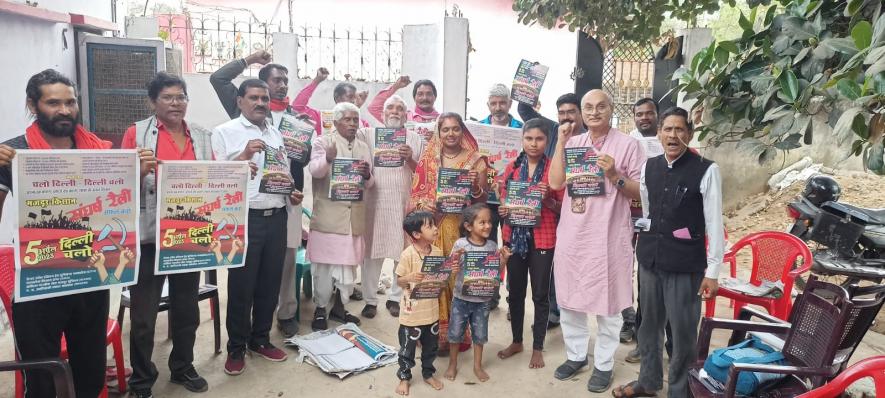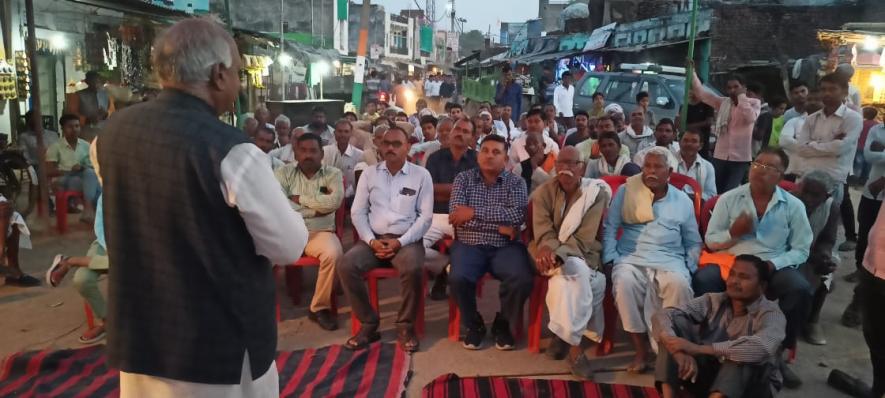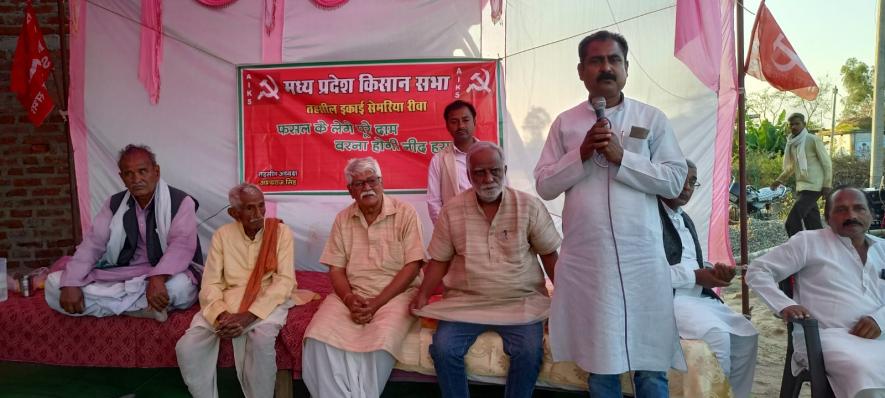MP: Workers, Farmers Mobilise in Big Way for April 5 Mazdoor Kisan Sangharsh Rally in Delhi

Bhopal: Miffed with the state of affairs of workers and farmers in the Amrit Kaal of the Indian economy, trade unions in Madhya Pradesh are joining the call of the April 5 'Chalo Delhi' campaign.
To protest against the ‘anti-labour and anti-farmer’ policy of the Union government, the Centre of Indian Trade Unions (CITU), All India Kisan Sabha (AIKS), and All India Agricultural Workers Union (AIGWU) have called the 'Mazdoor Kisan Sangharsh Rally' at Delhi's Ram Lila ground.
Left unions have called upon the people of Madhya Pradesh to participate in the April 5 rally to mobilise the working class against crony capitalism, inflation, privatisation, unemployment, non-implementation of labour laws, growing communalism and others.

"We have held dozens of meetings with the coal, cement, transport and ASHA-USHA and Anganwadi workers' union inviting them to join the April 5 rally at Delhi," said Pramod Pradhan, a CITU leader in Madhya Pradesh. He is also overseeing the preparations for the rally in the state.
"Upon our call, many farmers and labour rights leaders have agreed to join the rally to voice their ordeals."
He said the organisation had published a 20-page pocket booklet highlighting the state of affairs of farmers and labourers in the country under the current regime. Similarly, posters and leaflets were distributed among the workers.
"Over 50,000 pocketbooks were distributed, 20,000 posters and over 2 lakh leaflets were distributed among the workers especially in coal, cement and transport sectors to create an awareness about the ill policies of the NDA government which cast a shadow on the marginalised," he added.
Apart from the working sector, the Left unions have been running an intense campaign in the rural areas of Gwalior-Chambal and Vindhya regions of Madhya Pradesh.
AIKS joint secretary Badal Saroj, who has been campaigning to mobilise the farmers and agricultural labourers in rural areas, said, "Close to 50 rallies, on bikes and bicycles, have been carried out to create awareness in rural areas. We have covered close to 1,000 villages in the Gwalior Chambal and Vindhya regions for the April 5 rally."
Talking to Newsclick, he also shed light on the prevailing situation in villages.
"Migration in rural areas is rampant as MNREGA is dysfunctional owing to a fund crunch. Out of eight crores, five crore population in the state are registered as marginalised and survive on PDS ration. The quality of the ration they receive is unfit for human consumption."
In the budget 2023-24, the Indian government has slashed 33% budget for MGNREGA (Mahatma Gandhi National Rural Employment Guarantee Act) schemes. The state government also cut over 10% of funds compared to last year.
He further said, "Those dependent on agriculture have been struggling for the Minimum Support Price (MSP). Most of the promises given to the farmers by the Centre to end a year-long farm protest have not been fulfilled."

"We have planned to pull a crowd of over 15,000 to 20,000 in the April 5 rally."
HELD 23 NATIONAL STRIKES SINCE THE 1990s: TAPAN SEN
Tapan Sen, general secretary of CITU, was on tour to Bhopal last month to meet with the BHEL workers. Sen met with the workers on a day-long visit to the state capital and gave a slogan of 'reach to the unreached.'
Newsclick spoke to Sen on the prevailing conditions of trade unions, workers and labour codes.
Why are trade unions not effective in the new India?
Tapan Sen: With the emergence of the private sector, the focus has shifted to the middle class from the working class. Yet, after the 1990s, unions held over 23 national strikes forcing the government to agree to their terms. But the rhetoric that unions are ineffective is part of the demoralising theory.
For example, power sector employees went on strike in Maharashtra for one week and stalled privatisation. In Uttar Pradesh, three days of power strike brought the Yogi Adityanath-led BJP (Bharatiya Janata Party) government to its knees. In Karnataka, power sector unions only gave notice for strikes, and the government has already accepted the demands. In Chhattisgarh, after 38 days of strike, Anganwadi workers emerged victorious over their demand for increased pay. We are also coming to Delhi. This time, we will see this government in its own court.
What changes have hampered labour rights?
Sen: The Union and state governments tweaked several labour laws in the last few years to lure private investment. Apart from labour laws, the labour courts were made dysfunctional. The recently introduced atrocious four labour codes do away with the right to legal recourse; denial of permanent work and longer working hours is against labour rights. Besides, the state and Union governments tweaked several laws to withhold the right to protest and sack workers who protest.
What are the challenges for trade unions in this digital age?
Sen: One of the significant challenges we have failed to address so far is the spread of communalism among workers. Workers fall prey to Right-wing propaganda, and in between, the government tweaks labour laws to benefit corporations. Apart from communalism, we failed to make a presence on social media which could be a valuable tool to unite workers. Besides, we overlooked the private sector, where workers receive peanuts for 10-12 hours of work.
As far as the media is concerned, they used to highlight the plight of the working class. But now, corporate-owned media is busy propelling the government agenda to divert public attention.
What is the way forward?
Sen: We have planned to launch several campaigns to connect with the workers with the slogan 'reach the unreached'. Six-month-long connect campaigns have been planned to connect factory, mine and agriculture workers.
It is difficult for the working class, but we are fighting and winning. Our protest forced the government to roll back the 12-hour-long working hours to eight hours. It was introduced during the first COVID-19 lockdown.
Similarly, the four-year-long Kolveer scheme was launched for the coal sector along the lines of Agniveer. But after the intense backlash from trade unions, it was dropped.
Get the latest reports & analysis with people's perspective on Protests, movements & deep analytical videos, discussions of the current affairs in your Telegram app. Subscribe to NewsClick's Telegram channel & get Real-Time updates on stories, as they get published on our website.























